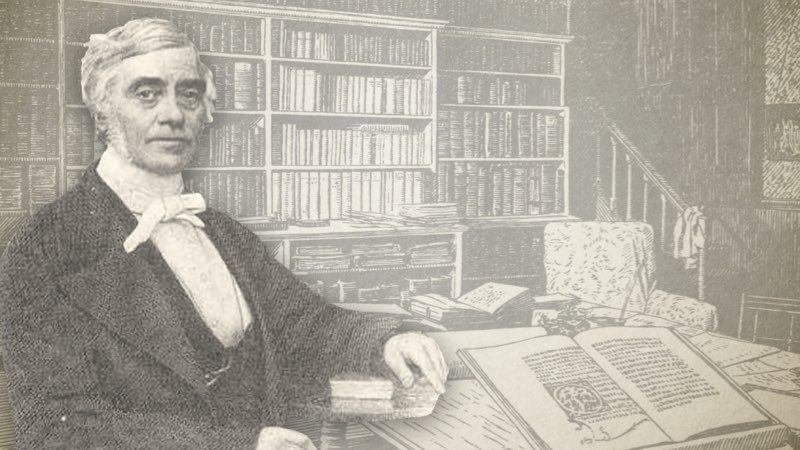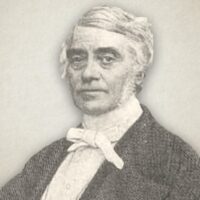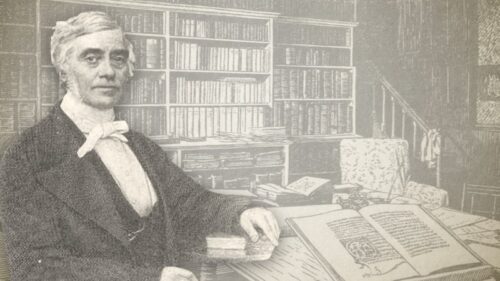
The Free, Eternal, Sovereign And Unalterable Love Of God
December 12, 1834.
My dear Mrs. Rackham,—Having an opportunity of sending a letter to town, I avail myself of it to redeem my promise of writing to you. You are now, doubtless, thoroughly settled in your new abode, and in some measure reconciled to your mode of life. The noise and bustle of Rochester must have seemed very strange to you at first, and I dare say you have often turned in thought to your former quiet abode, where almost the only noise was from the brook that ran by your window. But if faith is in exercise, the hand of God will be seen in this change. And besides, what does it really matter where we spend the few years of our pilgrimage here below? God is to be found, known, loved, and served as much in all the stirring noise of a town, as in the seclusion of a country village. His abode is in the heart, according to His promise, “I will dwell in them, and walk in them” (2 Cor 6:16). Thus, also, He speaks in the following passages, to which you can easily refer— Exodus 29:45; Leviticus 26:11, 12; Isaiah 57:15; Zechariah 2. But you will say, “Would indeed it were so with me! Oh, that I could have the Lord God to dwell in me and walk in me!” If we look to our own fitness, we must say with Solomon of old (1 Kings 8:27), “Will God indeed dwell on the earth? Behold, the heaven and heaven of heavens cannot contain You—how much less this house that I have built?” If God indeed dwells with any soul, it is only through the Son of His love that He does so.
As to us, “all our righteousnesses are as filthy rags, from the sole of the foot even unto the head there is no soundness in us, but wounds, and bruises, and putrefying sores.” “As a fountain casts out her waters” (Jeremiah 6:7), so we cast out our wickedness. And in our hearts—I speak from experience—there is nothing to be found by nature but pride, unbelief, worldliness, idolatry, infidelity, and sensuality. It is a cage of unclean birds, a nest of scorpions, and often seems to realize John’s description of Babylon (Rev 18:2), “the habitation of devils, and the hold of every foul spirit.” In ourselves, then, we shall ever be vile and sinful, and utterly unfit that Jehovah should dwell in us and walk in us. If we are acceptable to God at all, it is only so far as we are “accepted in the Beloved.”
The Holy Spirit describes the Church (Ezekiel 16:5) as cast out in the open field, to the loathing of her person, in the day that she was born. This is our state by nature. But then He adds, verse 8—”Now when I passed by you, and looked upon you, behold, your time was the time of love.” There is nothing beautiful or lovely in man to attract the notice of the Lord. No! on the contrary, he is vile and loathsome in His sight. Love, on the part of God, is free, as He says (Hos 14:4), “I will love them freely.” And it is from this free, eternal, sovereign, and unalterable love on His part, and not from any goodness or fitness on theirs, that He spreads His skirt over any poor soul (Ez 16:8), and enters into covenant with it.
But you, or rather your unbelieving heart, will say, “This is not for me.” But, why not for you? Are you not a poor, helpless, sin-burdened creature? Are you not without hope, and without help? Well, these are the people for whom this free salvation is appointed! “He has filled the hungry with good things, and the rich He has sent empty away.” The wine and milk of the gospel “is without money and without price.” If you are weary and heavy laden, Jesus speaks to you, and invites you to come to Him, Matt 11:28. I know well what an unbelieving heart is, and how it always takes part against us, and writes up bitter things; but still I would encourage you “to hope,” like the father of the faithful, “against hope”; yes, “to hope to the end for the grace that is to be brought unto you at the revelation of Jesus Christ” (1 Peter 1:10).
Your trials, doubtless, are many, and I dare say at times you are well-near ready to sink under them. But these are the appointed lot of the true children of God. There is a needs-be for all their temptations, crosses, and afflictions, as Peter speaks, 1 Peter 1:6, 7.
It gives me pleasure to learn that you have met with a profitable ministry. I hope your present minister will wear well. It is one thing to hear profitably for a short time, and another to find a living spring in the minister’s soul for a long time together, so as to minister grace and good to the children of God. I would advise you to be slow in forming any connection, either with a church as a member of it, or with professors in general. The best are the hardest to find out, and the most obtrusive are likely to be those whose religion lies more in word than in power. If the Lord sees good He can raise up for your comfort Christian friends, but it is better for a stranger like yourself to wait, than to form acquaintances which you must afterwards give up.
We are going on here much as usual. “My leanness, my leanness, woe unto me!” seems to be the general cry. But, indeed, from the shortness of the days and my liability to cold I have not been able to see much of the people lately. S. Hall seems to be a little revived from her deadness, though she is still full of complaints, and often speaks of you with affection. Indeed, I trust we all remember you with affection, and regret your departure. You mention, I think, in one of your letters, your thanks to me for having taught you much of the evil of your heart. I could wish I had been enabled to have taught you as much or more of Christ. We have two lessons to learn, one full of pain, the other full of pleasure. The first you have been learning, hitherto, in a small measure. The second, which consists in the experimental knowledge of Christ, is that which you have still to learn. And as you learn to know the cleansing, healing, purifying efficacy of His blood, love, grace, and righteousness, so will your heart rejoice with joy unspeakable and full of glory.
Whatever some may say about experimental ministers building up their people in doubts and fears, I do not believe it is so. They are no enemies to gospel joy, if it be joy of the right sort and obtained in a right way. They are, indeed, enemies, and so may they ever be, to rotten hopes and false assurances; but when they see a heart truly broken and contrite, they love to see it healed by the great Physician. Though I have advised you to be slow to form religious friendships or even acquaintances, still if you can in your vast population find a few humble souls who are experimentally taught sin and salvation, it would be profitable for you sometimes to converse with them. Our cold, dead heart needs refreshing, and “as iron sharpens iron, so a man sharpens the countenance of his friend.”
But seek the Lord in solitude, as David of old; “commune with your own heart upon your bed, and be still.” The food which Christ gives is called “hidden manna,” and the new name written on the white stone no man knows, except he who receives it (Rev 2:17). One spiritual, believing view of Him in secrecy and in solitude is far better than to talk of Him with the tongue, and to hear of Him by the hearing of the ear for a twelvemonth. He will give you such visits as He sees good for you, and I believe you will generally find them before trouble, or in trouble, or after trouble.
Our assemblies at church and lecture have been fairly well attended of late, especially the latter. What we need is to be endued with power from on high. We need showers of blessing to make our hard hearts soft, and our barren hearts fruitful. When He is present with us, all is well; when He is absent, all is ill. Believe me to be, my dear Mrs. Rackham,
Your sincere and affectionate Friend,
J. C. Philpot.
Joseph Philpot (1802-1869) was a Strict and Particular Baptist preacher. In 1838 he was appointed the Pastor of the Churches at Oakham and Stamford, during which time he became acquainted with the Gospel Standard. In 1849, he was appointed the Editor for the Gospel Standard Magazine, a position he held for twenty-nine years (nine years as joint Editor and twenty years as sole Editor). John Hazelton wrote of him—
“A man of great grace, profound learning, and with a literary style equal to any of his contemporaries. For twenty years he was editor of the "Gospel Standard," in which his New Year's Addresses, Meditations, Reviews, and Answers to Correspondents were outstanding features. His ten volumes of sermons, entitled "The Gospel Pulpit," and his four volumes of "Early Sermons," testify to his powers as an expositor of the Word, to the beauty of his illustrations, and the heart-searching character of his ministry. He was born at Ripple, Kent, where his father was rector, and educated at Merchant Taylor's and St. Paul's schools, entering at Oxford University in 1821, taking a first-class, and ultimately becoming Fellow of his College. He accepted an engagement in Ireland as a private tutor, but prior to his departure he was unexpectedly detained at Oakham. There he bought a book, "Hart's Hymns," and was much struck by the beauty of many of them. In 1827, in Ireland, eternal things were first laid upon his mind, and "I was made to know myself as a poor lost sinner, and a spirit of grace and supplication poured out upon my soul." He returned to Oxford in the autumn, and "the change in my character, life, and conduct was so marked that everyone took notice of it." Early in 1828 he was appointed to the perpetual curacy of Chislehampton, with Stadhampton—or Stadham—not far from Oxford. He soon gained the love and esteem of his parishioners. His Church was thronged, and his labours were unceasing amongst young and old. In 1829 he became acquainted with William Tiptaft (1803-1864), vicar of Sutton Courtney, and a friendship commenced which death alone severed. Both ministers had been led to know the truths of predestination and election and the final perseverance of the saints, and preached them with unflinching boldness. Persecution soon arose; it always does in some quarter when there is a faithful ministry. In 1831 Tiptaft built a chapel at Abingdon, where he remained as a Baptist pastor until his death. In 1835 Mr. Philpot resigned his living and his fellowship; the temporal sacrifice entailed was such that he had to sell almost all his books. Soon after this momentous step had been taken he preached in a chapel at Newbury, which some of his friends had procured for the purpose. He writes: "When I therefore began to open up that God had a chosen and peculiar people the whole place seemed in commotion. One man called aloud, 'This doctrine won't do for me!' and started out, and was instantly followed by five or six others. I was not, however, daunted by this, but went on to state the truth with such measure of boldness and faithfulness as was given me. Some of my friends at the chapel thought that the people would have molested me, but no one offered to injure me by word or action, and I came safe out from among them." He also writes: “——is, I fear, something like the robin spoken of in 'Pilgrim's Progress, who can eat sometimes grains of wheat and sometimes worms and spiders. I am quite sick of modern religion; it is such a mixture, such a medley, such a compromise. I find much, indeed, of this religion in my own heart, for it suits the flesh well; but I would not have it so, and grieve it should be so." He preached much at Allington, near Devizes, and in the Metropolis, and many other places. His ministry was attended by crowds, and was blest to saint and sinner. In 1838 he became Pastor of the Churches at Oakham and Stamford, residing in the latter town till failing health caused his removal to Croydon. At the time of his settlement at Stamford he became associated with the "Gospel Standard," and in 1849 he was appointed editor. He was a most interesting writer on the things of God. His sermons are experimental rather than doctrinal, but when he treated of doctrine it was in a comprehensive and scriptural way, as his "Meditations" amply prove. His book on "The Eternal Sonship" practically closed the controversy which gave it birth. His "Reviews" are most instructive and brilliantly written. Would that the younger members of our Churches made a study of them! "The Advance of Popery" was another work which had a wide circulation, and events today prove the accuracy of the forecasts so solemnly made therein. His "Letters" have been a means of grace to many, and it is refreshing through them to know the spiritual history of some of the excellent of the earth in their day and generation, and to have glimpses of services at Eden Street, Gower Street, and Great Alie Street Chapels, and at Came and other places, especially in Wiltshire.”
Joseph Philpot's Letters
Joseph Philpot's Sermons




